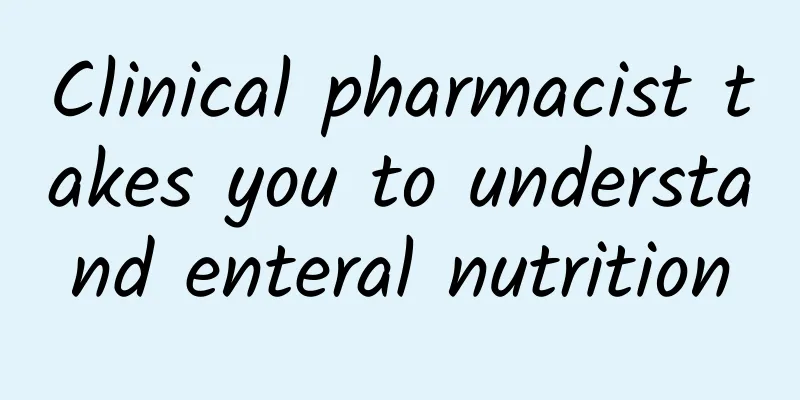Clinical pharmacist takes you to understand enteral nutrition

|
A clinical pharmacist will help you understand enteral nutrition? In clinical work, many patients are unable to eat on their own, or have poor appetite and eat very little. At this time, some family members of patients think that patients do not need to eat if they are not hungry, or only give a small amount of milk, rice porridge, and soup as three meals a day. For patients, if nutritional support cannot keep up at this time, the body will slowly consume, increase the incidence of complications, prolong hospitalization time, and increase hospitalization costs. How to provide reasonable and effective nutritional support is a problem. What is enteral nutrition? Why not just give the "nutrient solution" intravenously? What kind of patients can choose enteral nutrition? What is enteral nutrition? Nutritional support refers to dietary nutrition measures taken according to the principles of nutrition to treat or alleviate diseases and enhance the clinical effect of treatment. It is also called therapeutic nutrition. Currently, clinical nutritional support pathways are divided into parenteral nutrition and enteral nutrition. Enteral nutrition refers to a nutritional support therapy in which patients with gastrointestinal digestion and absorption functions are provided with energy and nutrients through oral or tube feeding, which are digested and absorbed through the gastrointestinal tract to meet the body's metabolic needs due to pathological or physiological changes in the body or some special requirements of treatment. Parenteral nutrition is the supply of nutrition from the vein as nutritional support for pre-operative and critically ill patients. All nutrition supplied from outside the intestine is called total parenteral nutrition. Key points: Generally speaking, if the patient's gastrointestinal function exists or partially exists and has a certain absorption function, enteral nutrition is the first choice for nutritional support. In what situations is enteral nutrition appropriate? ① Patients with certain gastrointestinal functions who cannot, are insufficient or have contraindications to oral intake; ② Gastrointestinal diseases: short peptide syndrome, intestinal fistula, inflammatory bowel disease, pancreatitis or pancreatic cancer; ③ Malnutrition or nutrition risk screening (NRS2002) score ≥ 3 points; ④Preparation for colon surgery, postoperative gastrointestinal surgery, and cancer patients with nutritional risks. Why should I receive enteral nutrition? Since food does not enter the intestine smoothly, in the past, clinical practice often chose to abandon the still functional intestine and use intravenous infusion for parenteral nutrition support. This is not only very expensive, complicated to operate and has many complications, but patients also feel that they have not taken a drop of water every day. What is more troublesome is that if the gastrointestinal tract lacks food stimulation for a long time, the intestinal mucosa may atrophy, leading to intestinal flora disorders and damage to the intestinal barrier function. Therefore, nutrition through the intestine can not only provide the substances needed for metabolism, but also promote intestinal peristalsis and restore intestinal immunity, which plays a vital role in maintaining the barrier function of the intestine. What are the advantages of enteral nutrition compared to parenteral nutrition? ① Improve and maintain the structural and functional integrity of intestinal mucosal cells and maintain the normal growth of gastrointestinal intrinsic flora. ② Improve the patient's immunity and weaken systemic inflammation and catabolic reactions. ③ Under the same calorie and nitrogen levels, the patient's body weight gain and nitrogen retention are better than parenteral nutrition. ④The technical operation and monitoring are simple, with fewer complications and lower costs. Let me repeat : Enteral nutrition is a common method and the preferred route in the process of nutritional support therapy. It is not advisable to rely too much on intravenous parenteral nutrition for the sake of convenience. You should follow the doctor's advice and choose the appropriate nutritional support method according to the patient's condition. Author: Yang Wubin, Chief Pharmacist and Clinical Pharmacist, Chongqing High-tech Zone People's Hospital Some of the pictures in this article are from the Internet and are used for public welfare communication. Thanks to the author of the pictures. If there is any infringement, please leave a message to contact us to delete it. |
<<: Zhiai Mama’s “Her” Class | What are the reasons for women’s dry bodies in autumn?
>>: How can I explain to people that not getting enough sleep will also make you fat?
Recommend
What should I do if my calf muscles ache during confinement?
Many women will experience many adverse reactions...
What to do if you have big breasts but no nipples
Most of the time, the breasts have no nipples bec...
What to do if a woman's breasts sag
The breasts are an area that every woman pays gre...
Urology "magic weapon"! Changsha Fourth Hospital introduces you to "ureteral stent"
"Doctor, why do you need to put a tube in af...
What is the relationship between excessive amniotic fluid and drinking water?
Women should have a prenatal check-up every month...
Can heavy menstrual bleeding kill people?
A common saying to describe women's menstruat...
Recurring every year, hot and itchy! A woman is so self-conscious that she dares not reach out! These practices are not advisable
Reviewer of this article: Zhou Xiaobo, Doctor of ...
Endometrium pictures
The causes of thin endometrium are divided into s...
What causes white lips in women
Red lips and white teeth can reflect a woman'...
Can a caesarean section be performed under general anesthesia?
After a woman has been pregnant for 10 months, th...
How many times can a woman have a caesarean section in her lifetime?
Cesarean section is a very common delivery techni...
What to do if a woman has pain during sex after menopause
Pain during sexual intercourse after menopause is...
How many diseases can a tube of erythromycin eye ointment, which costs only a few dollars, cure? Here comes the answer
Expert in this article: Li Xue, Peking Union Medi...
What's going on when there's blood again after my period is over?
Female friends all know that vaginal bleeding onl...









